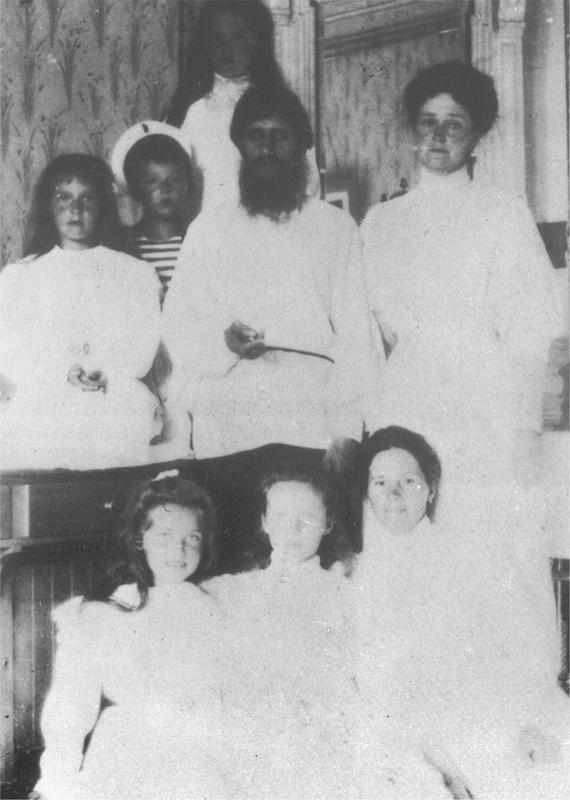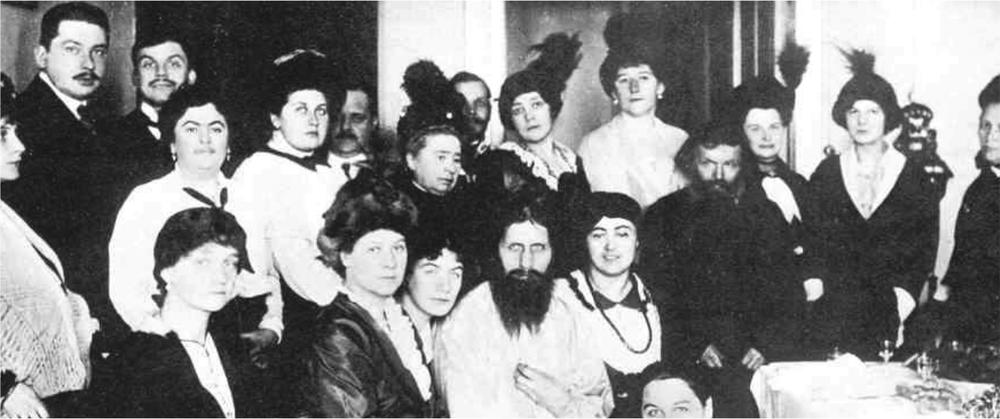Rasputin (10 page)
Authors: Frances Welch



Rasputin at the Alexandra Palace with the Tsarina, the maid Maria Vishnyakova and all five Imperial children
Â


W
ith relations at Court growing thornier, Rasputin also found himself losing supporters in the Church. First among these was his former houseguest and fishing companion, the monk Iliodor, who was becoming increasingly deranged, locking himself in a monastery at Tsaritzyn with thousands of his followers. At the end of his services he would decapitate a makeshift dragon he called Revolution. He built tunnels under the monastery and, in a final act of hubris, planned to build a massive tower.
Unleashing attacks upon his old friend, Iliodor complained that Rasputin âemitted a disagreeable odour' and was bad with old ladies. He quoted Rasputin dismissing one elderly petitioner: âYour love pleases me, mother, but God ain't with it.' He insisted the Synod take steps against Rasputin, or he would renounce his faith. The Synod responded, instead, by ordering him to leave Tsaritzyn and join another, distant monastery.
Unaware of the extent of Iliodor's betrayal, Rasputin was initially protective of him. He spoke up on his behalf when the Tsar also tried to order him to leave Tsaritzyn. He told the Tsar that, if he did not stop persecuting Iliodor, God would take revenge on the sickly Tsarevich. But later, on learning the truth, he switched sides without hesitation, barking: âFile his teeth.'
The Tsar decided to send a loyal aide de camp, Alexander Mandryka, to Tsaritzyn to deal with Iliodor. But Mandryka ended up being distracted by shocking tales of Rasputin's debauchery. The nuns at Tsaritzyn were claiming that, during his visit, Rasputin had been conducting orgies and bathing with novices. When Mandryka returned and met the Tsar, on February 10 1911, his reports on Iliodor were eclipsed by these shocking stories: âIt is even said he [Rasputin] enjoyed the favour of Her Majesty,' Mandryka concluded, before bursting into tears. The Tsar felt obliged to send for a glass of water.


Rasputin with Hermogen and Iliodor

With his followers at Gorokhovaya Street

So Iliodor's rabble-rousing continued, for the moment, unchecked. But his
coup de grâce
, in terms of mischief-making, came in late 1911 when he copied and disseminated the letters he had pocketed at Pokrovskoye. None of his sermons could have unleashed the mayhem created by these innocent outpourings from the four young Grand Duchesses and their mother, the Tsarina, to their Man of God.
The letters from the girls were almost theatrically fond. Grand Duchess Olga wrote: âIt is hard without you, there is no one to tell my troubles to.' Her younger sister, Tatiana, asked: âHow's Matriosha [Maria]. Whenever we get together at Anya's [Anna Vyrubova's] we always talk about all of you, we miss you, we miss you⦠Mother is ill without you.' It was Tatiana who recorded conversations with Rasputin and kept all his letters to the family.
Grand Duchess Maria, the third daughter, who slept with a Bible given to her by Rasputin, wrote: âI am kissing you. Kissing your pure hands⦠Let me see you alone about God.' The youngest, Grand Duchess Anastasia, then aged ten echoed: âI kiss you and bless me.'
The Tsarina's letter, unfortunately, seemed to go beyond
fondness: âI wish to fall asleep on your shoulder. I love you. I believe in you. I kiss you warmly'. The words were misleading; she was not in love but in the throes of a sort of religious hysteria. There was no impropriety intended; these declarations came from a woman of such modesty that she assiduously covered the lavatory and bath when they were not in use.
One of the braver ministers took the Tsarina's letter to the Tsar, who glanced at it and shoved it in a drawer, commenting drily: âYes the letter is genuine.' He fired the Minister, A. A. Makarov, a few days later.
It was a rough period for Rasputin. And there was to be no let-up. The Tsar had barely recovered from Mandryka's outburst and Iliodor's public exposure of the Tsarina's passionate letter before Rasputin arrived at the Palace bearing compromising photographs of himself cavorting with a Finnish ballerina. He had fallen victim to what would become a common Soviet tactic: discrediting by way of â
kompromat
'. He had been told that unless he left St Petersburg the photographs would be shown to the Tsar, and so he had opted for a pre-emptive strike.
His tactic paid off, with the Tsar declaring simply that Rasputin had been weak and allowed himself to be exploited by revolutionaries. The Tsarina was probably never told about the photographs.

R
asputin managed to brush off these slings and arrows, not least Iliodor's rages against him. He would have a harder time dealing with the rancour of the more senior members of the Church. By the beginning of 1910, the most fervent of his early supporters, Bishop Feofan, was having insurmountable doubts about his Man of God. His earlier worries about the lavish furnishings at Pokrovskoye had been overshadowed by complaints of Rasputin abusing and even raping women. He wrote an anguished letter to another highly regarded priest, Hermogen, who had also once supported Rasputin, convinced that âthe devout fire flowed in his soul'.